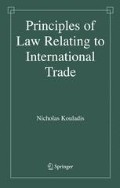Access this chapter
Tax calculation will be finalised at checkout
Purchases are for personal use only
Preview
Unable to display preview. Download preview PDF.
References
Convention Supplementary to the Warsaw Convention, for unification of certain rules relating to international carriage by Air performed by a person other than the contracting carrier, Guadalajara, September 18, 1961.
Protocol to amend the Warsaw Convention, Guatemala City, March 8, 1961: This dealt with carriage of passengers and their baggage but not cargo or mail. The Montreal Additional Protocols 1975: These three Protocols replaced the old unit of liability with Special Drawing Rights (S.D.R.). They applied the changes to the original Warsaw convention, the Hague Protocol, and the Guadalajara convention, respectively. The Montreal Protocol No.4: This dealt with cargo provisions, e.g. airway bill, of the Warsaw convention as amended by the Hague Protocol.
Over fifty-four countries, including the U.S.A. and all E.C. Member States have ratified the Convention.
This Convention has been approved on behalf of the European Union, by Council Decision 2001/539/EC, ‘on the conclusion by the European Community of the Convention for the Unification of Certain Rules for International Carriage by Air (“the Montreal Convention”)’, (O.J. 2001 L 194, 18/07/2001, p.38). This 1999 Convention in effect supersedes the Warsaw Convention and subsequent related provisions. The Carriage by Air Acts (Application of Provisions) Order 2004, (S.I.2004, No. 1999), brought the Montreal 1999 Convention into force in the U.K. Amendments to the Carriage by Air Act 1961 were made by the Carriage by Air Acts (Implementation of the Montreal Convention 1999) Order 2002 (S.I.2002, No.263).
The ‘gold franc’ referred to is a ‘diplomatic’ unit of currency, not an actual coin in commercial use, weighing 10/31 of a gramme and being of millesimal finess 900. The Carriage by Air (Sterling Equivalents) Order 1996, (S.I. 1996, No.244), came into force in February 1996, and introduced the Sterling equivalents for expressing the limitation figures contained in the First Schedule (containing the Warsaw Convention 1929, and the amended Warsaw Convention 1975; 250 francs are £15.89, 5,000 francs £317.71, 125,000 francs £7942.79, and 250,000 francs £15,885.58).
See for example, Applied Implants Technology Ltd. v. Lufthansa Cargo AG [2000] 2 Lloyd’s Rep.46, where a carriage was subject to the original Warsaw Convention. C claimed damages against D for damage caused to part of a machine contained in one of the packages carried by D (all packages included in one airway bill). Under the amended Convention the weight of the damaged package or the combined weight of all packages covered under one air waybill was to be taken into account. However, D contended that the value of the remaining packages had not been affected since the damage to one part had not permanently affected the value of the remaining parts. Further, D suggested that C could replace the damaged machinery part without delay. It was held that the important point in the carriage with regards to this provision was the end of the carriage by air in which the damage was sustained. In the circumstances the damage caused the remaining parts of the machine to be worthless until the damaged part had been replaced. Furthermore, the ability of a claimant to mitigate its loss by obtaining a replacement part speedily would not affect the limitation of liability.
Article 19, Montreal Convention, 1999.
The same would seem to be position under the Montreal Convention; Article 55. Cf. Philippson and Others Appellants v. Imperial Airways, Limited [1939] A.C.332, H.L., where it was held, inter alia, that a State (Belgium) which had only signed the (Warsaw) Convention was a ‘High Contracting Party’.
Article 31(2), Montreal Convention, 1999.
Rights and permissions
Copyright information
© 2006 Springer Science+Business Media, Inc.
About this chapter
Cite this chapter
(2006). Carriage of Goods by Air. In: Principles of Law Relating to International Trade. Springer, Boston, MA. https://doi.org/10.1007/0-387-30699-4_14
Download citation
DOI: https://doi.org/10.1007/0-387-30699-4_14
Publisher Name: Springer, Boston, MA
Print ISBN: 978-0-387-30386-4
Online ISBN: 978-0-387-30699-5
eBook Packages: Humanities, Social Sciences and LawLaw and Criminology (R0)

